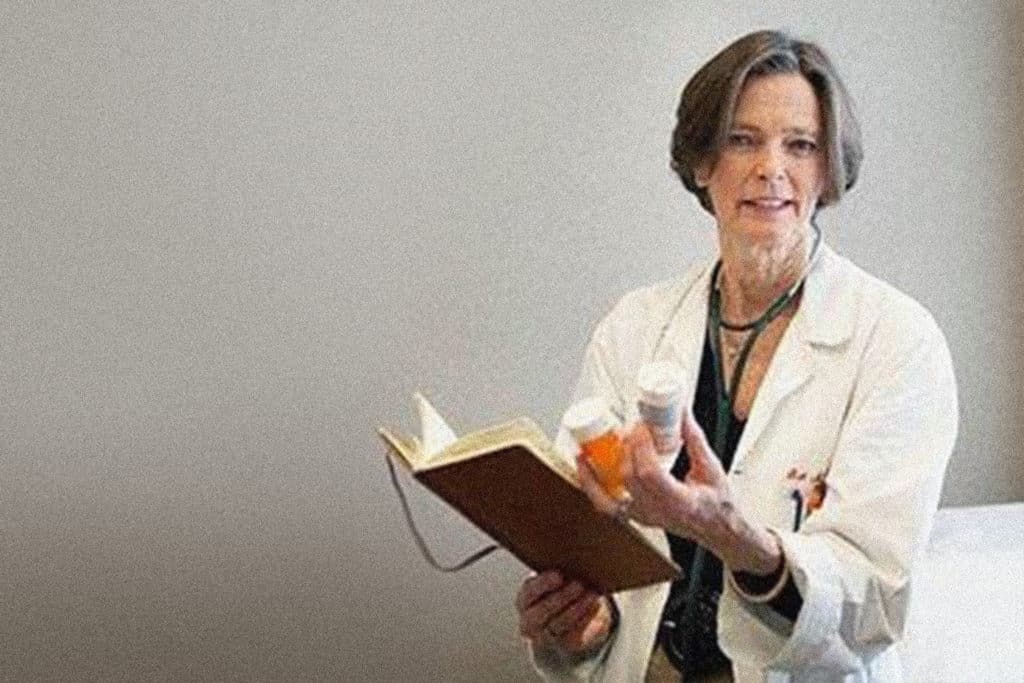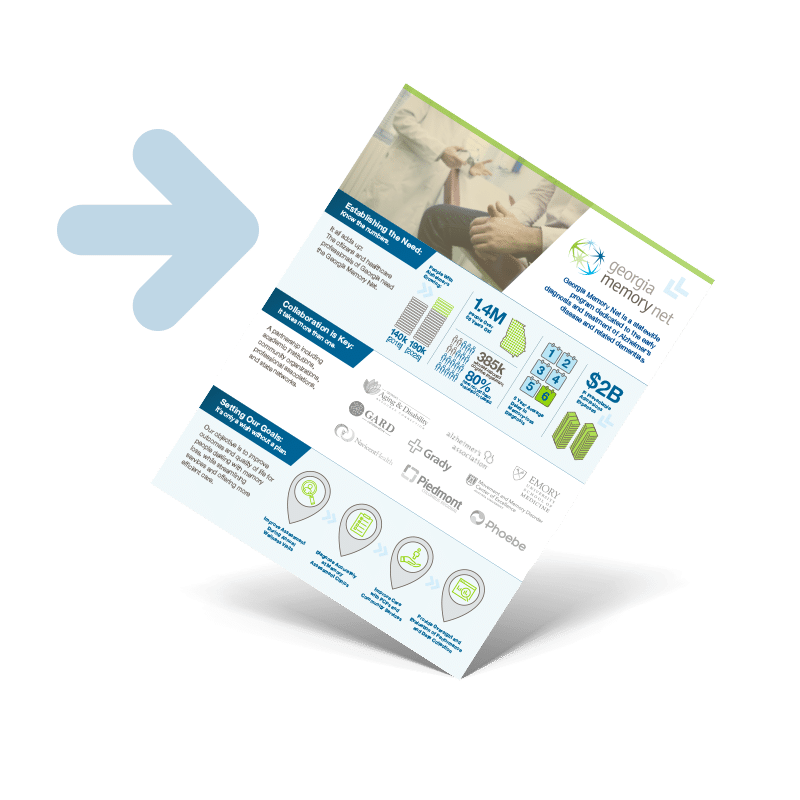Acclaimed Health Literacy Experts Advocates for Treating Cognitive Conditions in a Way that Patients and Families Can Understand

Dr. Ruth Parker is a Professor of Medicine, Pediatrics and Public Health, and a Sr. Fellow in Ethics at Emory University in Atlanta, Georgia. Her core passion is health literacy, a critically important, yet often overlooked subject that is now receiving significant focus in the physician’s work with Georgia Memory Net. For almost three decades, Dr. Parker has focused on research, education, and policy efforts to make the demands and complexities of health and healthcare align with the skills and abilities of regular, every-day people.
“I didn’t start my career to end up doing what I did,” shared Dr. Parker. “But it came to me because I witnessed saw how many people in this public hospital where I was practicing were struggling to pick up a pill bottle and simply read the label. So, I spent a decade defining what health literacy could mean and performing primary research to support it. I then spent another decade doing intervention-related research and working to craft health policy. What I found is that it really relates to how we take healthy content and processes and make them align with people’s abilities to find them, get them, use them, and understand them.”
Georgia Memory Net recognizes the need for health literacy if it is to make a real impact on cognitive health and elderly populations
Georgia Memory Net is a new program dedicated to providing healthcare professionals with the resources they need to help diagnose patients experiencing memory loss or cognitive impairments. The network also provides initial support and education while linking patients and care partners with community services that can provide ongoing support. The program is supported by the Georgia Department of Human Services’ Georgia Alzheimer’s Project, along with partners in Georgia academic institutions, community organizations, professional associations, and the State Aging and Disabilities Resource Connection Network.
“When I first heard about this program, I realized that it could be so incredibly important,” shared Dr. Parker. “I grew up in Georgia, and I am delighted to be a part of an initiative that has far reaching impact across this state. I think it takes advantage of something that Emory has built out through its Brain Health Center and program and allows us to replicate this model, even reaching rural areas. And the health literacy aspect is really starting to tackle hard issues such as empowering a patient and their family to figure out how to get help and how to understand what’s going on at a really tough time in their lives.”
Dr. Parker took a moment to describe what’s currently happening in the rollout of Georgia Memory Net. She explained that essential infrastructure is being put into place, with meaningful links to social services being built in five different geographic settings. “Moving forward we’re really focusing on how do we work with healthcare providers on the ground in each of these regions to raise awareness that not only are these links available, these are actually high-functioning links to social services that really do help people,” she stated. “We’re really trying to build the kind of infrastructure and relationships that that allow us to take what we have learned over time in many fields and apply it to a very under resourced and under-served population.”
“It’s not only sharing what we’ve learned, but also learning from the communities we serve,” Dr. Parker continued. “We will be able to collect good data over time that really represents the strongest interest of patients, their families and the care providers that are in the community. It allows us to really take a big step towards population health across multiple communities. But it’s also important to understand that it can be really frustrating for a primary care physician to hand out something to people in need and not know what’s on the other side of it. This is why we plan to analyze the performance of our infrastructure across five MACs in these geographically distinct regions, so we’ll be able to tailor our approach to the needs of each local community.”
Dr. Parker hopes that by creating these meaningful links to social services that physicians will be able to understand what’s actually available in their area to help patents with cognitive conditions, including how to connect patients, families and other care partners with those resources and what to expect. “I hope they will understand that this is more than just a phone number,” shared Dr. Parker. There will be a real human being ready to help people that are probably feeling quite overwhelmed at what they are facing. We’re supporting relationships and helping to build a network that has a face on it, because I think it’s that human connection that means so much to people.”
For Dr. Ruth Parker, the connection is personal
Dr. Parker shared one of the personal reasons she feels that working to shape the future of Georgia Memory Net is so gratifying. “I would call myself a very proud 64-year-old, and I’m actually kind of excited about developing user-centered design on a project where I am close to the target population,” she said. “I think that a very important aspect is to partner with some of the people who look more like the people that we’re targeting for care. It’s how we can effectively move the ball forward with health literacy.”
When I think about primary care physicians, from urban neighborhoods to the most rural parts of the state, I think they consider themselves part of the community,” she continued. “They’re very much interested in the welfare and the outcome of their patients. And I think they have enormous insights into these patients and what their struggles really are. As we’re talking about what health literacy 2.0 looks like and this ability to take content and processes and align it with what we know about the skills and abilities of people to use it in a digital world, we very much need to hear from these physicians and how we can work with them. I think we have an enormous opportunity to connect with practitioners on the front lines, who are often overwhelmed without enough time and really are doing the best they can with what they have. Our team can give them something to take to their patients and families with cognitive decline, and ultimately we create a model that can be helpful for other states. That’s what I think is important about Georgia Memory Net and why I’m happy to be a part of it.”
Ruth Parker, M.D.
Dr. Parker is Professor of Medicine, Pediatrics and Public Health, and a Sr. Fellow in Ethics at Emory University in Atlanta, Georgia. She attended Davidson College and the University of North Carolina at Chapel Hill School of Medicine, completed residencies in Internal Medicine and Pediatrics at the University of Rochester, and was a Clinical Scholar at the University of Pennsylvania.
For over two decades, Dr. Parker’s work has focused on research, education, and policy efforts to advance our nation’s health literacy. She is an author of the Test of Functional Health Literacy in Adults (TOFHLA) and of the definition of health literacy used by Healthy People, the IOM, the NIH, and the Affordable Care Act, as well as many scholarly pieces on health literacy. She is a National Associate of the National Research Council of the National Academy of Sciences and serves on Advisories to the FDA and PCORI.
Dr. Parker has received national awards in recognition of her work, including:
- The Silver Achievement Award from the AAMC
- The Richard and Hinda Rosenthal Award from the ACP
- The Walter C. Alvarez Award from the American Medical Writers Association
- The Cecilia and Lenard Doak National Health Literacy Award
- The FDA Advisory Committee Service Award
In addition to her work in health and healthcare, Dr. Parker is founding Co-Director of TRACE (The Renaissance Academy at the Center for Ethics) at Emory University, where her efforts support cross-disciplinary work to integrate health and the humanities.
Georgia Memory Net at a Glance
What is Georgia Memory Net and why does it exist? There’s so much information about Alzheimer’s and related dementias in Georgia, and how to diagnose and treat them, that it can become overwhelming. We’ve done our best to simplify the info into a clear one-page infographic.

